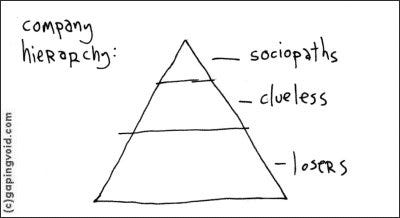Jason and Eiso deep dive into corporate politics, hierarchies, and the sociopaths that often sit at the top as they analyze the behaviors of famous C-Level leaders, such as Microsoft’s Steve Ballmer, and pick apart what Engineering Leaders can learn from them.
Here are a few of our favorite moments from the conversation
What do we learn from Steve Ballmer? What is the totality here? And I like to pick on him as Steve Ballmer, the CEO, but I don't talk enough about Steve Ballmer, the VP of Sales, because he was amazing. He really was. But he should’ve never been the CEO.
We're in an environment where we're starting to see who's getting outplayed and who has played a different game long ago. I believe that because the scoreboard is money in Silicon Valley or title achievement, we have listened to the wrong set of people for a 15-year period and will continue to, because in that period they made money or had some achievement.
Looking at the sociopaths at the top of large companies, the bad drive out the good, but the good still go somewhere.
I think that if you understand who the excellent builders are, this is the cycle you're always going to see: They grow, then jump, have success, don’t wanna put up with it anymore, leave the game entirely, and come back in pockets and do like small little bits of things.
💡 Topic Explainers
💡 The Gervais Principle
The Gervais Principle, created by Venkatesh Rao, refers to a concept in workplace dynamics that suggests that bosses often promote less competent people to management positions so they can exploit their work, while keeping them in a position of relative powerlessness.
The idea is that competent employees can be relied upon to do their jobs well, but are unlikely to abuse their power, whereas less competent individuals are more likely to be susceptible to exploitation.
The principle is named after the British comedian and creator of The Office, Ricky Gervais.
👤 Steve Ballmer
Although he was a great VP of Sales, Steve Ballmer is often criticized for his tenure as CEO of Microsoft, and is one of the subjects of this episode.
During his time as CEO, Microsoft's stock performance was widely considered to be underwhelming, and the company struggled to keep pace with the rapid changes in the tech industry, such as the rise of mobile computing and the decline of personal computers. Ballmer was also criticized for his management style, with some claiming that he was resistant to change and slow to respond to new trends and developments in the tech industry.
💰 Gresham’s Law
Gresham's Law basically states that people tend to spend the lower value currency and hold onto the higher value one. If you have a $20 bill and some $1 coins, you'll probably use the coins instead of the $20 bill.
This law can have an impact on the economy, like if too many people use the lower value currency, it can cause inflation and erode the value of savings. And if too many people hold onto the higher value currency, it can lead to a shortage of currency in circulation, which can negatively impact trade and commerce.
Eiso proposes that this law can be applied in leadership, where bad leaders drive out good people, who in turn leave to smaller companies — as those smaller companies become bigger and more successful, bad leaders (or sociopaths) come in, and, again, drive out the good people.
📝 The Tyranny of The Structuralist
"The Tyranny of the Structuralist" is an essay by American feminist Jo Freeman about how structure and systems can sometimes become so important, they start to smother creativity and crush individual expression.
Basically, when people are too focused on sticking to a certain system or way of doing things, they can end up stifling new ideas and holding back progress.
Think of it like this: if everyone in a company is all about keeping things the way they've always been, they might miss out on new and better ways of doing things. Or if a government is so focused on maintaining order, they might overlook people's needs and wants.
The idea behind this concept is to get people thinking about how they're being influenced by the structures around them. It's a wake-up call to not get so caught up in the "way things have always been done" that they forget to question if it's the best way. By recognizing the "tyranny" of structuralism, people can be more mindful of how these structures shape their behavior and work to push against them.
Watch this episode YouTube > https://youtu.be/QK3ZumAWUuU
Join the discussion and follow us on twitter @devleadership_
Developing Leadership is powered by Athenian. We are introducing a winning approach to engineering metrics that can help you empower your teams to autonomously improve. If you want to learn more, go to athenian.com












